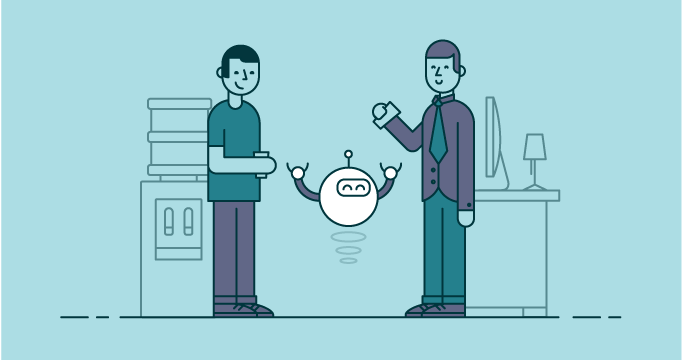When does artificial intelligence stop being more of a tool and become more like a coworker? Machines can already drive, hold conversations and even give witty answers, like Apple’s Siri for example. A majority of mature organisations have invested, or plan to invest in artificial intelligence in the near future, so it’s a matter of time before robots become our work buddies. AI will help make workflows more reliable, giving people more time to focus on human-centric tasks, and put the organization on the forefront of innovation.
In order to learn to work alongside robot co-workers, both sides are going to have to learn. Robots can do this by machine learning, while they are introduced to the nuances of the human workplace. It’s actually similar in many ways with working alongside our human co-workers. However, because the way the way robots process data, there are a few things to keep in mind when you support your robot co-worker.
Improve external factors
Robots can only do what they’re programmed to do. They won’t understand if an external factor is making them perform their task inefficiently or incorrectly. You may have noticed this before, if you’ve had an awkward conversation with a chatbot for example.
What makes humans effective in the workplace, is the ability to improvise. We can make changes that support our robots functions, like adjusting the messaging of a chatbot to be more relevant. Another example is Zendesk’s Answer Bot, that can automatically direct customers to help articles. If these articles are old and outdated, they won’t be helpful for customers. In this case, the Answer Bot can’t do its job effectively. Looking for external factors to help your robot co-workers will improve their functionality.
Know when to step in
Another limitation of AI is that they’re not so good at picking up social cues. This can be bad if the machine is left unsupervised. For example, a chatbot might interact with a customer in a way that leads to a poor customer experience. This can lead to a bad dehumanized image of the brand or customer agitation. This issue will likely be larger in the future as the majority of customer interactions will be handled by robots in a few years.
Sometimes you cannot replace human ingenuity. It is important to learn to take over for your robor coworker if a customer is getting frustrated or if a process is yielding inaccurate results. You should also review your organization’s AI capabilities and how they fit your business needs. A problem can easily result in a demotion for your robot coworker, which is fine. Robots don’t have feelings.
Measure AI success by measuring your own
AI-powered technology is only successful when it makes others successful. This means that you can get an insight into how well your robots are working, by evaluating your organization’s efficiency. This might result in some uncomfortable truths about your business readiness for AI, but those are often the things that lead to the best adjustments. The good thing is that your emotionless AI-powered coworker is great at handling criticism. It will still perform its tasks without getting disheartened!
Source: Zendesk
Zendesk Partner in Thailand
092-262-6390
097-008-6314 (Sales)
support@dmit.co.th
Official LINE



